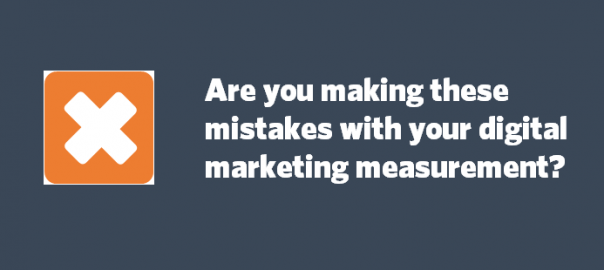
How do you prove the value of your digital marketing efforts?
Whether you’re a consultant trying to demonstrate the impact you’re having for a client, or you’re a small business owner trying to establish whether your time has been well spent, it’s one of the biggest challenges we face as marketers. The problem is compounded by the fact that most of us are already strapped for time and, as a result, measurement can be poorly executed or neglected altogether.
But what’s the point in having a digital marketing strategy if you don’t know what results it’s delivering? Next week I’ll be hosting a webinar in partnership with Constant Contact on the topic of ‘solving the digital marketing measurement puzzle’ and to get the ball rolling I’ve asked a panel of marketing specialists for their take on the topic.
Looking specifically at four of the biggest forms of digital marketing (email, SEO, social media, and content marketing), I asked:
What are the most common mistakes people make when it comes to digital marketing?
Email Marketing

Tamsin Fox-Davies is Senior Development Manager at Constant Contact. As a small business evangelist, Tamsin has made it her mission to help small business people create successful and sustainable organizations.
Not measuring anything
One of the biggest mistakes is not measuring anything at all. It happens far too often. That’s either because businesses are using tools that don’t facilitate measurement, or because they aren’t bothering to look at the reports that are generated by the system.
Not using the data
The second mistake is those that are measuring, but aren’t using the data to inform their email strategy. They collect and report on the key metrics and then don’t adapt their approach based on what they’ve learned.
Obsessing about open rates
The third mistake is obsessing about open rates. People often see this as the be-all and end-all of email marketing, but how often is an open the end goal? It’s ‘action rates’ that really matter.
Worrying about others, not yourself
Finally, there’s an almost obsessive tendency for some businesses to compare themselves with others. The aim should be to improve what you’re doing as you can only ever start where you are.
SEO

Sean Clark runs his own marketing agency with a focus on SEO, PPC, and social media. Sean was formerly Head of Web at Adnams PLC.
Not measuring business results
People typically try to measure SEO activity or rankings related metrics. Where instead they should be measuring business results. For instance, one tactical element of SEO may be acquiring links from 3rd party sources.
The theory is that the more relevant links you have the better your rankings. The mistake is that if the number of links is your target whoever is performing that task needs to just hit links to deliver on your objective. The same can be seen with rankings, just improving rankings for a particular phrase or term doesn’t achieve a tangible businuess goal.
Instead you should note the activity, but measure its impact on an increase in relevant traffic to the website, that delivers more leads or sales.
Social Media Marketing

Tamara Baranova is the founder of TJConsulting. She provides digital marketing mentoring and support for lots of small businesses.
Not measuring anything
Many businesses don’t measure anything on social media. Sometimes it comes down to lack of knowledge of how to do it, or understanding of the importance of tracking, or lack of time to set up and manage the data collection process. However, without the right data available it’s nearly impossible to make strategic investments into future marketing investment or to evaluate which social media channel is performing better than others.
Measuring the wrong data
Those that are measuring data are often measuring the wrong data. We tend to focus on measurements that are easy to understand and track — number of fans or followers. And if the number of fans or followers grows, we tend to think we are doing well with social media marketing. However, it’s not always the case. Ultimately, your priority is to grow the business through more sales and more clients, not just win the popularity contest on social media networks.
Not using data to inform decision-making
Finally, some business owners would set up the right tracking, and will start collecting the data automatically. Yet they never actually look at and analyse it properly to work out which marketing channels work the best. Just because your site has Google Analytics, doesn’t mean you are done with SEO. So just because you receive performance reports from social media, it doesn’t mean that your social media marketing is doing well.
Content Marketing

Jeremy Taylor is Senior Account Manager (B2B) at Our Social Times. He runs successful social media and content marketing campaigns for a wide range of B2B technology and financial businesses.
Focusing on what’s easy, rather than what’s right
Some marketers look no further than consumption metrics (such as views) or rudimentary sharing metrics (such as tweets). These are usually easily accessible using Google Analytics (or similar programmes) and they provide a snapshot of whether content is popular, but are these metrics enough to demonstrate the impact your content is having on business goals? Probably not.
It’s lead generation and sales metrics that will prove whether content marketing is contributing to the business’ bottom line, so you need to think about including relevant metrics from all of these categories.
Applying the same metrics to different types of content
Marketers often try to apply the same measurement framework to entirely different pieces of content, regardless of where it fits into the sales funnel. Content designed to generate awareness will look very different to content designed to nurture leads and that needs to be reflected in how success is measured.
As part of our ‘growing your digital marketing agency’ series, on July 14th I’ll be joined by Tamsin, Sean, and Tamara for a discussion on how marketing agencies and consultants can prove value to clients. You can register here for free.
(197)





